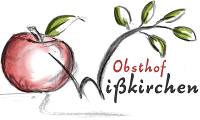"We have exited a year in which wages have risen sharply. On top of that, there are social security contributions that have to be factored in as well, and on top of that, pome fruit is one of the few products where growers receive less money for the goods," says Philip Wißkirchen. He himself cultivates a 36-hectare orchard and is chairman of the Fachgruppe Obstbau Bonn Rhein-Sieg (Bonn Rhein-Sieg Fruit Growers' Association).
Philip Wißkirchen
More difficult production conditions
In view of the financial situation, the general mood among member companies is rather gloomy, he said. "We are faced with 30 percent higher costs and a 20 percent drop in sales. If you then have to deal with problems such as hail, frost and pests, the costs mount up even more, while sales are dwindling," Wißkirchen said. "Additionally, more and more fruit growers are stopping their production, either because there is a lack of young talent or because they have to file for bankruptcy."
He is also critical about the fact growers are having to go without some crop protection products, even though they are always taking care to use them only selectively. "After all, this is also deducted from our profit. But consumers seem to want to do without crop protection products, while at the same time buying them as cheaply as possible. That is a very unrealistic idea. Agriculture is being blamed for many kinds of problems that we have nothing to do with."
Retailers as a reliable partner for regional marketing
According to Wißkirchen, parts of politics and the media are responsible for the lack of understanding among the population, as incorrect claims are often made, such as on the topic of glyphosate, which sometimes do not have scientific foundations. "If glyphosate is eliminated as an agent altogether, there will be some farms that will have to close because of it."
In regional marketing, he said, retailers are proving to be a reliable partner. "We are located here in a small fruit-growing region, but one of the most populous. Despite the solidarity towards regional production, we must not forget that retailers are made up of business people. We work with much higher production costs in Germany, which means we often can't keep up with the price level of imported goods."
Falling sales for organic products in particular
Nevertheless, he said, retail sales were turning out low for both conventional and organic produce. "Organic products in particular can quickly suffer significant losses at harvest due to pests. Organic farmers who sell their produce primarily to natural food retailers will face additional problems because consumers have less money to spend and are more likely to switch to conventional produce. For organic goods, the price is quite stable on average. In the conventional sector, one will find a price that is shifting downwards strongly, which in turn has consequences for the entire industry. The higher the inflation and the less money people have, the lower the sales will be in the organic sector." Accordingly, he said, no farms are expected to convert their production to organic for the time being.
Although there is no competition between Poland in Germany per se, Poland has a major influence on the European apple market due to its large production volumes. "If the EU market is saturated and Poland is too, this automatically means that we have to expect lower prices. The trade receives far more favorable prices from Poland and refuses to pay higher prices for German produce." Still, transporting goods from 1000 km away is questionable for the CO₂ balance, particularly if the goods are basically available on one's doorstep, the grower says.
About the Wißkirchen fruit farm
Wißkirchen grows apples on about 32.5 acres and pears on the remaining 4 acres. "Due to a lack of pesticides, we are barely getting a handle on the pear leaf sucker problem, which is why we have had to reduce our pear acreage. Among the varieties most grown are Elstar, Gala, followed by Braeburn and Pinova with 4 hectares. Wellant is experiencing a resurgence, especially in the Alte Land. However, this should be taken with a grain of salt. Wellant is a special variety that has a relatively low yield. If it were to become a mass product, prices will drop considerably."
Other varieties include the Boskoop variety and, in small quantities, Jonagold. "We're trying to cut down Jonagold some more, though. It's actually a good variety, but it has gotten a bad reputation over the years because of its characteristics."
For more information:
 Philip Wißkirchen
Philip Wißkirchen
Obsthof Wißkirchen
K&P Wißkirchen GbR
Rheinbacher Str. 36
53340 Meckenheim-Ersdorf
Tel.: +49 1516 7510944
E-mail info@obsthof-wisskirchen.de
Website: https://obsthof-wisskirchen.de
"fruit" - Google News
September 06, 2023 at 07:06PM
https://ift.tt/O1kG9DH
"We are faced with 30 percent higher costs and a 20 percent drop in sales" - FreshPlaza.com
"fruit" - Google News
https://ift.tt/GOLlYh4
https://ift.tt/R05rtDS
Bagikan Berita Ini














0 Response to ""We are faced with 30 percent higher costs and a 20 percent drop in sales" - FreshPlaza.com"
Post a Comment